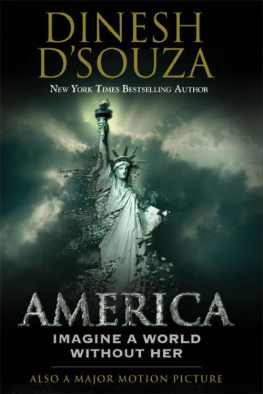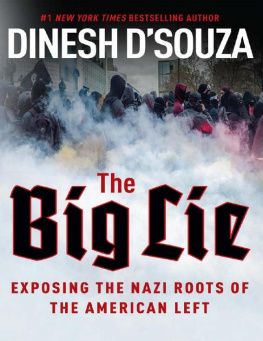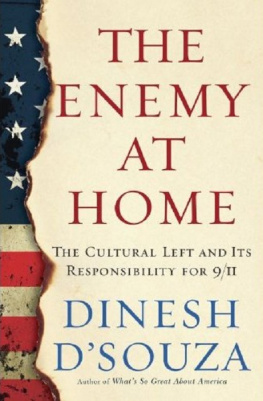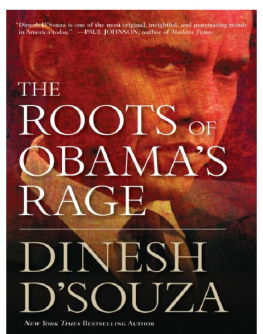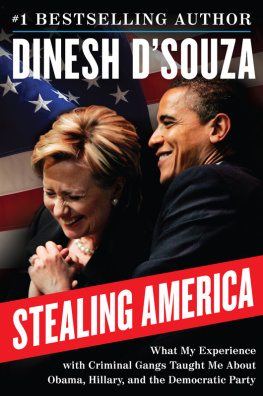| Dinesh D'Souza - America: Imagine a World without Her |
| Dinesh D'Souza |
| Regnery Publishing (2014) |
|
| Tags: | History - Politics
History - Politicsttt |
Is America a source of pride, as Americans have long held, or shame, as Progressives allege? Beneath an innocent exterior, are our lives complicit in a national project of theft, expropriation, oppression, and murder, or is America still the hope of the world?
New York Times bestselling author Dinesh D'Souza says these questions are no mere academic exercise. It is the Progressive view that is taught in our schools, that is preached by Hollywood, and that shapes the policies of the Obama administration. If America is a force for inequality and injustice in the world, its power deserves to be diminished; if traditional America is based on oppression and theft, then traditional America must be reformedand the federal government can do the reforming.
In America: Imagine a World without Her, D'Souza offers a passionate and sharply reasoned defense of America, knocking down every important accusation made by Progressives against our country.
Provocative in its analysis, stunning in its conclusions, Dinesh D'Souza's America will be the most talked about book of the year.
Copyright 2014 by Dinesh DSouza
All rights reserved. No part of this publication may be reproduced or transmitted in any form or by any means electronic or mechanical, including photocopy, recording, or any information storage and retrieval system now known or to be invented, without permission in writing from the publisher, except by a reviewer who wishes to quote brief passages in connection with a review written for inclusion in a magazine, newspaper, website, or broadcast.
First ebook edition 2012
eISBN 978-1-62157-228-2
The Library of Congress has cataloged the hardcover edition as follows:
DSouza, Dinesh, 1961-
America / Dinesh DSouza.
pages cm
Includes bibliographical references and index.
1. Political cultureUnited States. 2. United StatesPolitics and governmentMoral and ethical aspects. 3. Civilization, ModernAmerican influences. 4. National characteristics, American. 5. United StatesRelations. I. Title.
JK1726.D76 2014
973dc23
Published in the United States by
Regnery Publishing
A Salem Communications Company
300 New Jersey Avenue NW
Washington, DC 20001
www.Regnery.com
For Gerald Molen,
whose life embodies the spirit of America
CONTENTS
With him the love of country means Blowing it all to smithereens And having it all made over new.
ROBERT FROST
W riting in the mid-twentieth century, the French existentialist writer Albert Camus posed for human beings a central question: to exist or not to exist. In Camuss words, There is but one truly serious philosophical problem, and that is suicide. In a sense, this was Hamlets question: To be or not to be. For Camus, human beings had lived for millennia in a meaningful universe, a universe created by God, and one that gave significance and purpose to human life. But now, Camus wrote, we have discovered through science and reason that the universe is pointless, merely a constellation of flashing and spinning orbs and objects. God is absent from the world, which is another way of saying he does not exist for us. Consequently humans have to find ultimate meaning elsewhere, and there is nowhere else to look. So life becomes, in Shakespeares words, a tale told by an idiot, full of sound and fury, signifying nothing. Drawing on ancient myth, Camus likened the human predicament to that of Sisyphus endlessly rolling the rock up the hill, only to see it roll back down.
For Camus, the problem wasnt merely that the universe lacks meaning; it was that man desires meaning and there is no meaning to be had. Consequently our situation is kind of absurd. The absurd is born of this confrontation between the human need and the unreasonable silence of the world. Most people, according to Camus, ignore this tragic reality. They deflect the meaninglessness of their lives by engaging in various trivial pursuits. But for morally serious people, Camus says, this deflection is not an option. He proposes that humans must take the absurdity of their lives seriously, and in doing so, they must consider whether to live in tragic absurdity or voluntarily end their lives. Suicide, for Camus, was an ethical choice.
Of course people since ancient times have considered, and even committed, suicide. Typically, however, they did so out of personal despair, because life for them ceased to matter, or because they were in too much pain. Camus was original in that he raised existential despair to a universal human levelwe are all in the same predicamentand because he considered suicide as not just something people do, but something we ought to regard as a moral option, perhaps even a moral imperative. Strange though this may seem, it is a view taken up, to an extent, by the most radical of environmentalists who see human beings as a blight on the planet.
As it is with humans, so it may be with nations. Nations, of course, rarely attempt suicide. I cannot think of a single country that has tried to destroy itself. Presumably this is because nations, like humans, have a survival instinct. The survival instinct of nations is the collective survival instinct of the people in those nations. Why, then, would a nation attempt to destroy itself or commit suicide? Nations sometimes are conquered by other nations, or they collapse from within, but they never seek self-destruction. Yet Abraham Lincoln observed, a century and a half ago, that if America were ever to fall, it would not be by external means or even by internal collapse. Rather, it would be by the actions of Americans themselves. In his Lyceum Address, Lincoln said:
Shall we expect some transatlantic military giant to step the Ocean and crush us at a blow? Never! All the armies of Europe, Asia and Africa combined, with all the treasure of the earth, our own excepted, in their military chest, with a Bonaparte for a commander, could not by force take a drink from the Ohio, or make a track on the Blue Ridge, in a trial of a thousand years. At what point then is the approach of danger to be expected? I answer, if it ever reach us, it must spring up amongst us. It cannot come from abroad. If destruction be our lot, we must ourselves be its author and finisher. As a nation of freemen, we must live through all time, or die by suicide.
Surely Lincoln is not suggesting that Americaor Americansmight voluntarily seek destruction. Undoubtedly Lincoln believed that such an outcome would be the unforeseen consequence of calamitous misjudgment and folly. Yet I intend to show in this book that the American era is ending in part because a powerful group of Americans wants it to end. The American dream is shrinking because some of our leaders want it to shrink. Decline, in other words, has become a policy objective. And if this decline continues at the current pace, America as we know it will cease to exist. In effect, we will have committed national suicide.
While Obama acknowledges the existence of the plan, he is not responsible for the plan; it would be more accurate to say that it is responsible for him. The plan preceded Obama, and it will outlast him. Obama is simply part of a fifty-year scheme for the undoing and remaking of America, and when he is gone there are others who are ready to continue the job. What makes the plan especially chilling is that most Americans are simply unaware of whats going on. Their ignorance, as we shall see, is part of the plan.

